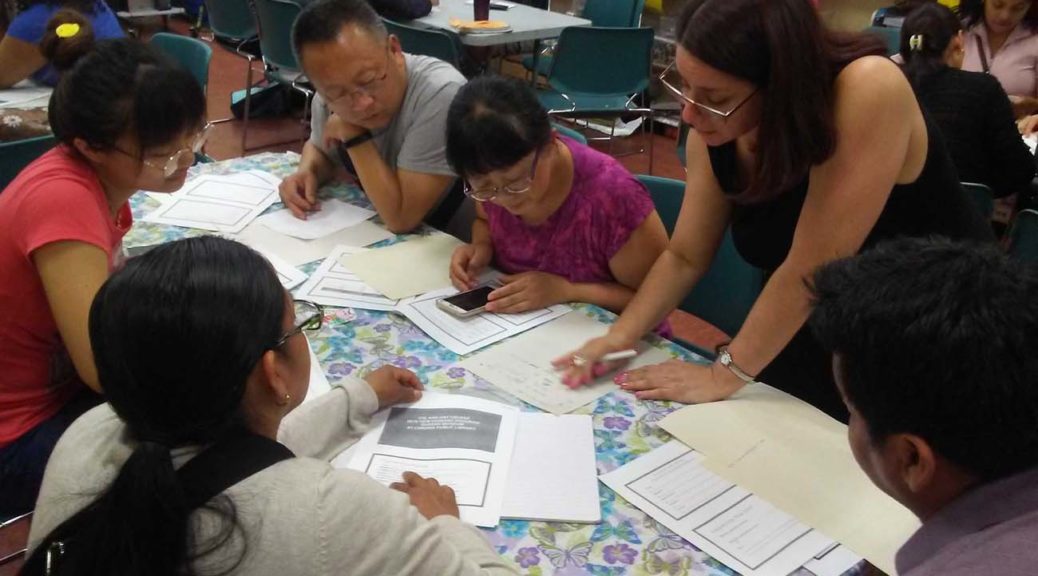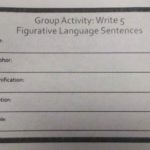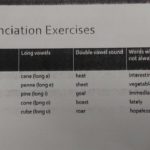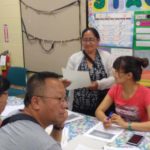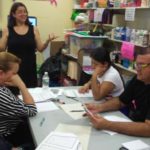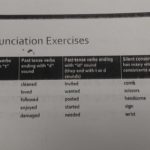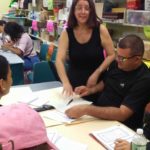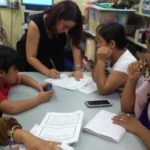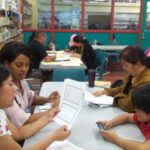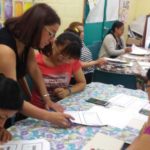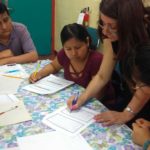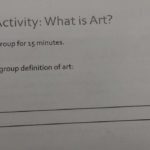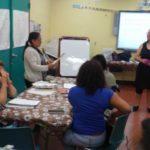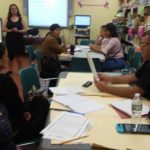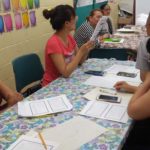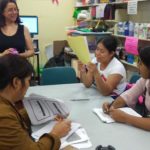Iniciamos nuestra tercera sesión con el juego ‘tirar la bola’, en el cual la maestra Estella Natal, hizo preguntas a los estudiantes q les lanzaba la bola. Estas preguntas eran a cerca de nosotros mismos y deberían ser respondidas usando oraciones completas.
Luego procedimos a leer un texto a cerca del Lenguaje Figurado: como el símil, la metáfora, la personificación, aliteración e hipérbole. Después de saber la definición del Lenguaje Figurado y sus ejemplos respectivos, procedimos a trabajar en grupos, designando a un secretario(a) quien escribió las oraciones creadas por todos los miembros del grupo. Cada grupo compartido con los demás grupos las oraciones creadas, a través de sus secretarios, quienes leyeron en voz alta las cinco oraciones escritas por cada grupo.
Posteriormente leímos los Ejercicios de Pronunciación, primero la maestra los leía en voz alta, luego los alumnos repetían hasta tener la correcta pronunciación de las palabras. Vimos palabras con vocales largas, vocales cortas, doble vocal y palabras con ‘E’ silenciosa.
En este curso de ESOL, Ingles como segunda lengua, veremos además el tema del Arte; para ello tuvimos una segunda actividad grupal en la cual deberíamos conversar con nuestros compañeros para responder la pregunta: Que es Arte para usted?
Se crearon grupos nuevos y se asignaron nuevos secretarios (as).En esta actividad la maestra nos hizo un comentario importante y útil para nuestra vida profesional; debemos de hablar dejándole saber a las demás personas que nosotros somos inteligentes.
Conclusión y cierre de la clase jugamos a ‘tirar la pelota’ en el cual, la maestra nos hizo la pregunta: ‘que fue lo que aprendieron hoy?’
Les queremos recordar que no tendremos clase el sábado 30 de Junio por ser feriado, y reanudaremos nuestras clases el sábado Julio 7.
Por favor, recuerden traer a clase los materiales impresos entregados durante las clases, lapicero y cuaderno.
Felicitaciones por la excelente disposición al estudio, trabajos personal y en grupo realizados en cada clase; todo este trabajo se verá reflejado en el desarrollo de sus habilidades en el idioma inglés.
We started our third session with the game ‘throwing the ball’, in which our teacher Estella Natal, asked questions to students who threw the ball. These questions were about ourselves and should be answered using complete sentences.
Then we proceeded to read a text about the Figurative Language: simile, metaphor, personification, alliteration, and hyperbole. After knowing the definition of Figurative Language and its respective examples, we proceeded to work in groups, designating a secretary who wrote the sentences created by all the members of the group. Each group shared with the other groups the sentences created, through their secretaries, who read them aloud the five sentences written by each group.
Later we read the Pronunciation Exercises, first, the teacher read them aloud, and then the students repeated until they had the correct pronunciation of the words. We saw words with long vowels, short vowels, double vowel and words with silent ‘E’.
In this ESOL course, we will also see the Art subject; for that reason, we had a second group activity in which we should talk with our classmates to answer the question: What is Art for you?
New groups were created and new secretaries were assigned. In this activity, the teacher made an important and useful comment for our professional life: ‘we must talk by letting other people know that we are intelligent’
Conclusion and closing of the class we played ‘throw the ball’ in which, the teacher asked us the question: ‘what did you learn today?’
We would like to remind you that we will not have classes on Saturday, June 30, for a holiday, and we will resume our classes on Saturday, July 7.
Please remember to bring the printed materials delivered to class during class, pencil, and notebook.
Congratulations on the excellent disposition to study, personal and group work done in each class; All this work will be reflected in the development of your English language skills.

